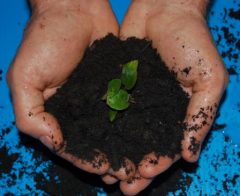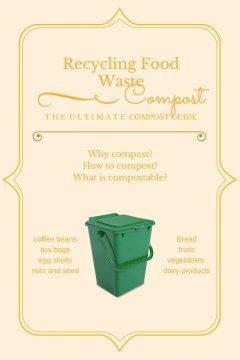by Carly Foubert, CFICE Communications RA
Whether you already have one or you’re thinking of starting one, today we’re going to talk about composting.
Composting is a super effective way to reduce household waste by diverting biodegradable material away from landfills. It also returns valuable nutrients to the soil, so you’ll have some great nutrient rich soil for your garden in the spring!

©EPA
This compost journey starts by purchasing a compost bin. You’re going to want something big and with holes so that the microorganism that will break down the biodegradable materials have access to oxygen. This will also prevent the production of methane gas through anaerobic digestion, which is the process of composting without oxygen, this is what occurs when compostable material begins to decompose when buried in landfills.
The achieve the perfect compost composition, it’s best to have a ratio that is half green and half brown compost. This refers to the colour of the biodegradable material; green can be grass clippings, plant matter, and green table scraps like spinach and broccoli. While brown matter can include wilted plants, pine needles, and straw or sawdust. This is important as the brown contributes carbon and green provides nitrogen, both of which will help in the composting.
Backyard composting isn’t the only way though, you can compost in the city too.
Or if you’re not interested in composting, but still want to contribute to reducing your waste, some cities have in place green bin programs, which can be collected and composted by the city. If not, you could also collect your organic waste and ask a farm near you if you can drop it off or a community garden if they would make use of the compost.
But what goes in the compost bin?
I’m glad you asked! There are so many things that can go in your compost bin! The EPA estimates that food waste is the number one material sent to landfills of our everyday trash! And globally about one-third of the food produced is lost or wasted, which is 1.3 billion ton annually!
Here is a quick list of SOME of the things that you can compost:
- Coffee Beans and tea bags
- Baking ingredients and baked goods
- Breads , cereals, crackers, and other grain products
- Dairy products (cheese and sour cream)
- Fruits and vegetables
- Eggs and eggshells
- Peanut butter
- Pet food
- Seeds and nuts
For a larger list check out this link.
Turn the compost every couple of weeks and keep everything moist to help maintain the compost.
Then just sit back and let the microorganisms do their thing and break down the biodegradable materials.